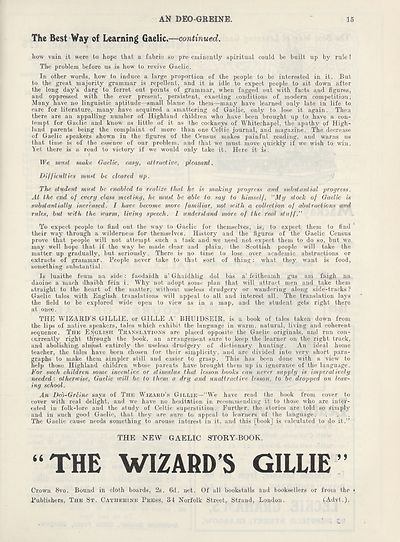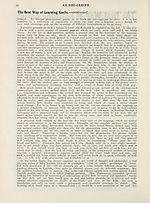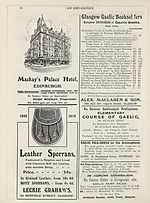An Comunn Gàidhealach Publications > Deo-gréine > Volume 10, October 1914-September 1915
(23) Page 15
Download files
Complete book:
Individual page:
Thumbnail gallery: Grid view | List view

AN DEO-GREINE.
15
The Best Way of Learning Gaelic.—continued.
how vain it were to hope that a fabric so pre^ eminently spiritual could be built up by rule !
The problem before us is how to revive Gaelic.
In other words, how to induce a large proportion of the people to be interested in it. But
to the great majority grammar is repellent, and it is idle to expect people to sit down after
the long day’s darg to ferret out points of grammar, when fagged out with facts and figures,
and oppressed with the ever present, persistent, exacting conditions of modern competition.
Many have no linguistic aptitude—small blame to them—many have learned only late in life to
care for literature, many have acquired a smattering of Gaelic, only to lose it again. Then
there are an appalling number of Highland children who have been brought up to have a con¬
tempt for Gaelic and know as little of it, as the cockneys of Whitechapel, the apathy of High¬
land parents being the complaint of more than one Celtic journal, and magazine. The decrease
of Gaelic speakers shown in the figures of the Census makes painful reading, and warns us
that time is of the essence of our problem, and that we must move quickly if we wish to win.
Yet there is a road to victory if we would only take it. Here it is.
IFe mud make Gaelic, easy, attractive, pleasant.
Difficulties must be cleared up.
The. student must be enabled to realize that he is making progress and substantial progress.
At the end of every class meeting, he must be able to say to himself, “My stock of Gaelic is
subdantially increased. I have become more familiar, not with a collection of abstractions and
rules, but with the warm, living speech. I underdand more of the real stuff."
To expect people to find out the way to Gaelic for themselves, is, to expect them to find ’
their way through a wilderness for themselves. History and the figures of the Gaelic Census
prove that people will not attempt such a task and we need not expect them to do so, but we
may well hope that if the way be made clear and plain, the Scottish people will take the
matter up gradually, but seriously. There is no time to lose over academic abstractions or
extracts of grammar. People never take to that sort of thing : what they want is food,
something substantial.
Is luaithe feum na side : faodaidh a’ Ghaidhlig dol bas a’ feitheamh gus am faigh na
daoine a tnach dhaibh fein i. Why not adopt some plan that will attract men and take them
straight to the heart of the matter, without useless drudgery or wandering along side-tracks ?
Gaelic tales with English translations will appeal to all and interest all. The translation lays
the field to be explored wide open to view as in a map, and the student gets right there
THE WIZARD’S GILLIE, or G1LLE A’ BHUIDSEIR, is a book of tales taken down from
the lips of native speakers, tales which exhibit the language in warm, natural, living and coherent
sequence. Thk English Translations are placed opposite the Gaelic originals, and run con¬
currently right th’reugh the book, an arrangement sure to keep the -learner on the right track,
and abolishing, almost entirely the useless drudgery of dictionary hunting. An ideal home
teacher, the tales have been chosen for their simplicity, and are divided into very short para¬
graphs to make them simpler still and easier to grasp. This has been done with a view to
help those Highland children whose parents have brought them up in ignorance of the language.
For such children some incentive or stimulus that lesson books can never supply is imperatively
needed : otherwise, Gaelic ivill be to them a dry, and unattractive lesson, to be dropped on leav¬
ing school.
An Ded-Greine says of Thf, Wizard’s Gillik—“We have read the book from cover to
cover with real delight, and we have no hesitation in recommending it to those who are inter¬
ested in folk-lore and the study of Celtic superstition. Further, the stories are told so simply
and in such good Gaelic, that they are sure to appeal to learners of the language....
The Gaelic cause needs something to arouse interest in it, and this [book] is calculated to do it.”
THE NEW GAELIC STORY-BOOK.
“THE WIZARD’S GILLIE”
Crown 8vo. Bound in cloth boards, 2s. 6d. net. Of all bookstalls and booksellers or from the *
Publishers, The St. Catherine Press, 34 Norfolk Street, Strand, London. (Advt.).
15
The Best Way of Learning Gaelic.—continued.
how vain it were to hope that a fabric so pre^ eminently spiritual could be built up by rule !
The problem before us is how to revive Gaelic.
In other words, how to induce a large proportion of the people to be interested in it. But
to the great majority grammar is repellent, and it is idle to expect people to sit down after
the long day’s darg to ferret out points of grammar, when fagged out with facts and figures,
and oppressed with the ever present, persistent, exacting conditions of modern competition.
Many have no linguistic aptitude—small blame to them—many have learned only late in life to
care for literature, many have acquired a smattering of Gaelic, only to lose it again. Then
there are an appalling number of Highland children who have been brought up to have a con¬
tempt for Gaelic and know as little of it, as the cockneys of Whitechapel, the apathy of High¬
land parents being the complaint of more than one Celtic journal, and magazine. The decrease
of Gaelic speakers shown in the figures of the Census makes painful reading, and warns us
that time is of the essence of our problem, and that we must move quickly if we wish to win.
Yet there is a road to victory if we would only take it. Here it is.
IFe mud make Gaelic, easy, attractive, pleasant.
Difficulties must be cleared up.
The. student must be enabled to realize that he is making progress and substantial progress.
At the end of every class meeting, he must be able to say to himself, “My stock of Gaelic is
subdantially increased. I have become more familiar, not with a collection of abstractions and
rules, but with the warm, living speech. I underdand more of the real stuff."
To expect people to find out the way to Gaelic for themselves, is, to expect them to find ’
their way through a wilderness for themselves. History and the figures of the Gaelic Census
prove that people will not attempt such a task and we need not expect them to do so, but we
may well hope that if the way be made clear and plain, the Scottish people will take the
matter up gradually, but seriously. There is no time to lose over academic abstractions or
extracts of grammar. People never take to that sort of thing : what they want is food,
something substantial.
Is luaithe feum na side : faodaidh a’ Ghaidhlig dol bas a’ feitheamh gus am faigh na
daoine a tnach dhaibh fein i. Why not adopt some plan that will attract men and take them
straight to the heart of the matter, without useless drudgery or wandering along side-tracks ?
Gaelic tales with English translations will appeal to all and interest all. The translation lays
the field to be explored wide open to view as in a map, and the student gets right there
THE WIZARD’S GILLIE, or G1LLE A’ BHUIDSEIR, is a book of tales taken down from
the lips of native speakers, tales which exhibit the language in warm, natural, living and coherent
sequence. Thk English Translations are placed opposite the Gaelic originals, and run con¬
currently right th’reugh the book, an arrangement sure to keep the -learner on the right track,
and abolishing, almost entirely the useless drudgery of dictionary hunting. An ideal home
teacher, the tales have been chosen for their simplicity, and are divided into very short para¬
graphs to make them simpler still and easier to grasp. This has been done with a view to
help those Highland children whose parents have brought them up in ignorance of the language.
For such children some incentive or stimulus that lesson books can never supply is imperatively
needed : otherwise, Gaelic ivill be to them a dry, and unattractive lesson, to be dropped on leav¬
ing school.
An Ded-Greine says of Thf, Wizard’s Gillik—“We have read the book from cover to
cover with real delight, and we have no hesitation in recommending it to those who are inter¬
ested in folk-lore and the study of Celtic superstition. Further, the stories are told so simply
and in such good Gaelic, that they are sure to appeal to learners of the language....
The Gaelic cause needs something to arouse interest in it, and this [book] is calculated to do it.”
THE NEW GAELIC STORY-BOOK.
“THE WIZARD’S GILLIE”
Crown 8vo. Bound in cloth boards, 2s. 6d. net. Of all bookstalls and booksellers or from the *
Publishers, The St. Catherine Press, 34 Norfolk Street, Strand, London. (Advt.).
Set display mode to:
![]() Universal Viewer |
Universal Viewer | ![]() Mirador |
Large image | Transcription
Mirador |
Large image | Transcription
| An Comunn Gàidhealach > An Comunn Gàidhealach Publications > Deo-gréine > Volume 10, October 1914-September 1915 > (23) Page 15 |
|---|
| Permanent URL | https://digital.nls.uk/125239740 |
|---|
| Description | Leabhar 10, Mìos Deireannach an Fhogharaidh 1914 gu Darna Mìos an Fhogharaidh 1915 |
|---|---|
| Attribution and copyright: |
|
| Description | This contains items published by An Comunn, which are not specifically Mòd-related. It includes journals, annual reports and corporate documents, policy statements, educational resources and published plays and literature. It is arranged alphabetically by title. |
|---|
| Description | A collection of over 400 items published by An Comunn Gàidhealach, the organisation which promotes Gaelic language and culture and organises the Royal National Mòd. Dating from 1891 up to the present day, the collection includes journals and newspapers, annual reports, educational materials, national Mòd programmes, published Mòd literature and music. |
|---|---|
| Additional NLS resources: |
|

